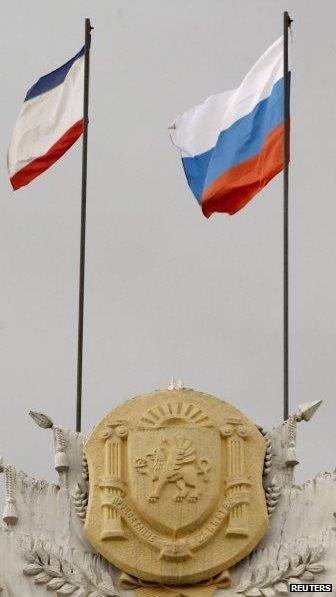Russia - punish or dialogue?
- Published
What is the right balance between moves to punish Russia and deter her from further aggression and those to de-escalate the crisis in Ukraine and encourage dialogue?

Russia's flag (R) and Crimea's regional flag on a building in Simferopol
That is the debate which will be had between Europe's leaders in Brussels on Thursday.
David Cameron is hoping that an alliance of the leaders of the UK, Sweden, Poland and other Eastern European countries can persuade their colleagues of the need for President Putin to pay a price for the occupation of Crimea.
They will push not just for the suspension of EU-wide agreements with Russia on visa free travel and energy, but also the explicit threat - though not the implementation - of targeted sanctions.
Germany's Chancellor Merkel is said to be worried that this may undermine attempts to start a dialogue between Russia and Ukraine and distract from the need to support the new government in Kiev both economically and politically.
She is likely to have many allies.
The prime minister, the German chancellor and France's President Hollande will meet to try to resolve their differences before joining a summit of the EU's 28 leaders.
They will do so knowing that President Obama will soon set out US sanctions and aware of the dangers of a significant gap between what the US announces and what the EU is prepared to do.